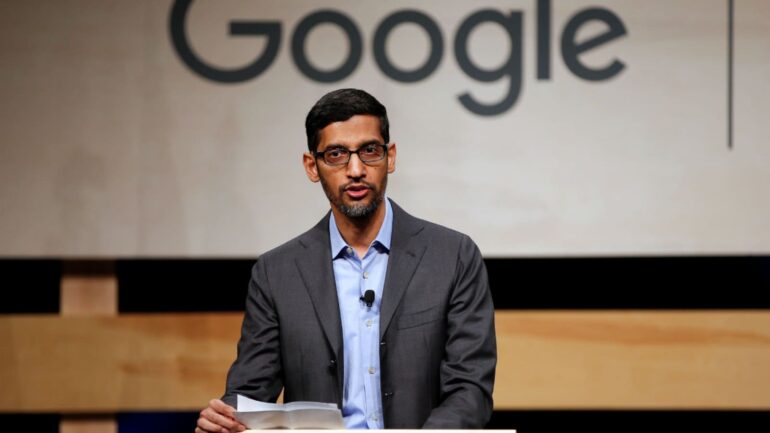TL;DR:
- Artificial intelligence (AI) tools are gaining popularity and could impact every industry.
- Sundar Pichai, CEO of Alphabet and Google, believes AI will cause significant labor market disruptions.
- Pichai also sees potential for AI to improve certain professions while acknowledging unintended consequences.
- Companies are already introducing AI tools for business use, such as Meta’s AI feature for advertisers.
- Major law firms are utilizing AI for tasks like document drafting and contract review.
- Pichai compares the current AI shift to past technological advancements like personal computers and the internet.
- Other tech CEOs, including IBM’s Arvind Krishna and Microsoft’s Satya Nadella, foresee AI automating repetitive tasks and enabling higher-value work.
- Geoffrey Hinton, an AI pioneer, expresses concerns about AI eliminating mundane jobs.
- Carl Benedikt Frey emphasizes the need to leverage AI for innovation and the creation of new occupations and industries.
- The future relationship between AI and the labor market remains uncertain, requiring careful navigation and consideration of societal implications.
Main AI News:
The ever-growing presence of artificial intelligence (AI) tools has ignited the imagination of the public. As technology giants like Microsoft and Google engage in a fierce race to enhance their AI capabilities, the repercussions are poised to reverberate across virtually every industry. Even Sundar Pichai, CEO of Alphabet and Google, an ardent advocate for the transformative potential of this “profound” technology, recognizes that it will send shockwaves through the working world.
In an interview with Nilay Patel of The Verge, Pichai shared his belief that AI will permeate every aspect of our lives. He emphasized, “I do think there are big societal labor market disruptions that will happen.”
However, Pichai also highlights the potential for AI to enhance certain professions, provided it is implemented correctly. Drawing attention to the legal profession, often regarded as one of the sectors most susceptible to AI disruption, he contends that despite technological advancements, the need for specific skills and services will persist.
Pichai states, “So, AI will make the profession better in certain ways, might have some unintended consequences, but I’m willing to almost bet 10 years from now, maybe there are more lawyers.”
While AI-powered products are still in their nascent stages, companies are already rolling out tools that leverage this technology for business purposes. Meta, in addition to investing in their own AI products, recently announced an AI feature for its advertisers. Furthermore, major law firms are already utilizing AI for tasks such as document drafting and contract review.
According to Pichai, we are currently witnessing a “platform shift” in AI, reminiscent of the anxieties accompanying the advent of personal computers, the internet, and mobile phones. He observes, “Twenty years ago when people exactly predicted what tech automation would do, there were very specific pronouncements of entire job categories which would go away. That hasn’t fully played out.”
Pichai’s perspective on AI’s impact on the labor force is shared by other prominent tech CEOs. Arvind Krishna, CEO of IBM, envisions AI taking over “30% to 50%” of repetitive office work, freeing up employees to focus on higher-value tasks. Satya Nadella, CEO of Microsoft, advocates for a collaborative approach between humans and AI, emphasizing that today’s workforce should be prepared to work “hand in hand with AI” Nadella believes that AI has the potential to unlock significant opportunities and unleash human creativity.
However, not everyone shares this optimistic outlook on the transformational power of AI in the job market. Geoffrey Hinton, an esteemed AI pioneer and former engineering fellow at Google, expresses concerns about the displacement of mundane jobs. He states, “It takes away the drudge work. It might take away more than that.”
There is also the question of leveraging AI to create new opportunities rather than eliminating existing ones. Carl Benedikt Frey, an economist known for his prediction that automation would eliminate 47% of US jobs a decade ago, emphasizes the need to explore how AI can foster innovation, leading to the emergence of novel occupations and industries.
Conlcusion:
The growing presence of artificial intelligence (AI) in various industries is poised to bring significant disruptions to the labor market. While certain professions may experience transformations and improvements through AI integration, there are concerns about the displacement of mundane jobs. Companies are already investing in AI tools, recognizing the potential for increased efficiency and productivity.
As the AI landscape continues to evolve, businesses must navigate this transformative era by leveraging AI to unlock new opportunities, fostering innovation, and addressing the societal implications of these advancements. Strategic planning and adaptability will be key for organizations to thrive in a market shaped by the transformative power of AI.

